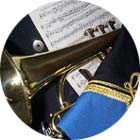
|
|
|
||
|
The need to spoil the classics: “To re-arrange or not to re-arrange that is the question.” With
apologies to William Shakespeare We relish our history within the brass band movement. We are proud that we have not only survived for over one hundred and fifty years, but for the most part we have flourished. I believe we have done so because we have respected our limitations and inherent conservatism, and it is why there is such a controversy over the question of adding percussion parts to old test-pieces. There are many fundamental questions that have to be asked when we look back into our proud past. What for instance is the appropriate sound and approach to use for different composers of the last century, than those of today? Would or would not, a band produce the same sound for Rimmer, Wood, Ball and Vinter as it would for Gregson, or Wilby? I suggest not. We have a wealth of repertoire covering over 150 years of the development of the brass band, but because of our obsession with contests and the fanatical desire to extend our technical ability we have encouraged composers to extend the extremes of control of the various aspects of technique to the detriment of musicianship. We are in grave danger of losing the delicate touch that orchestral musicians require to play Haydn or Mozart, and that is required by brass bands for Ball and Howells, as we have become obsessed with playing a million notes to the square inch, and have neglected the musicianship required to play a beautiful, simple melodic line. As an orchestral trumpet player I found it more difficult to play Haydn and Mozart, than Berlioz or Strauss, yet technically the parts are easier. I think it was Howard Snell who once described playing Mozart as knocking solid silver nails into the finest seasoned oak. I think I know exactly what he meant - if you don’t hit the nail exactly in the centre it will bend, no matter how much power you use. To play those early composers you have to delicately hit the notes truly in the centre, producing a smaller, rounder, softer sound, yet projecting it to the back of the hall. It is the beauty of playing works of truly world class composers that you know that what is written on the score is exactly what the composer intended - and it is this that brings us to the problem of so called “musical re-appraisal”. Would orchestral musicians approve of the addition of percussion, trombone, tuba, or saxophone parts to Bach, Haydn, Mozart, or Beethoven, or would string players produce the same sound for Bach, Mozart, Wagner, or Strauss - No? The dilemma is this. Instruments have improved over the past two hundred years so that a simple thing like string players using metal strings instead of gut, allows them to play louder and with a brighter sound, whilst key systems and bores on woodwind instruments have improved, giving them greater flexibility and technique. Brass bores and bells have got bigger allowing one to produce a wider variety of tone colour. This of course does not mean that the beauty of the music that is played, changes. How then does one relate the above to the brass band of today, with all the controversy of over-blowing, and tempi too fast for clarity. What is the old saying, “cleanliness is next to godliness”? Acoustics in concert halls, and making appropriate adjustments to suit is very rarely discussed in banding circles. Acoustics govern the length of notes, the more reverberant the hall the shorter length of note you need to play, the opposite is true for drier acoustics. Many brass players do not understand the ring at the end of notes, which gives a bloom to the sound. It is this for me that is the major problem to be addressed. Modern top class bands are now capable of such technical prowess and dynamic extremes that much of the beauty and music of classic brass compositions such as Pageantry, Epic Symphony and the like are spoilt not because they do not sound modern due to the lack of percussion, but because bands have forgotten how to musically approach the works. You don’t play Haydn the same as Stravinsky do you? And this finally brings us back to the question of added percussion parts. Just as orchestral musicians would baulk at the addition of extra parts to Haydn and Mozart, I believe it’s sacrilegious to rewrite the percussion parts for Percy Fletcher, and Herbert Howells. When these pieces of music were written, the composer knew exactly what sounds they wanted to hear. Like a Haydn symphony, these are compositions of their time. So how would these arrangers feel now that someone has re-arranged some of their original compositions? Not too kindly I would imagine, and where is the musicianship of the promoters of these contest that encourage such desecration. One of my most treasured possessions is the original score of Epic Symphony given to my father-in-law by Fred Mortimer and signed by Fred and all the members of Fodens Band after their triumphant win in the third leg of their second hat-trick at the Nationals in 1938. I wonder how that performance would compare to the winning performance to be given this year? Of course they would have sounded different – but the quality of the music would have shone through and great bands don’t need extra help to sound good. Gongs and Glockenspiels eh? Shame on the people who thought it was a good idea. David James. |
 |
|
